Setting the Stage for Better Outcomes
Understanding the critical role of executive functioning in autism spectrum disorder (ASD) is vital for developing effective therapeutic strategies. Executive functions, which include skills such as planning, organizing, attention regulation, and emotional control, underpin daily life skills and social functioning. Despite their importance, many individuals with autism face significant challenges in these areas, which can hinder their development and independence. This article explores how a deep understanding of executive functioning can inform tailored interventions, improve therapy outcomes, and ultimately enhance the quality of life for autistic individuals.
What Is Executive Function and Its Significance in Autism Therapy
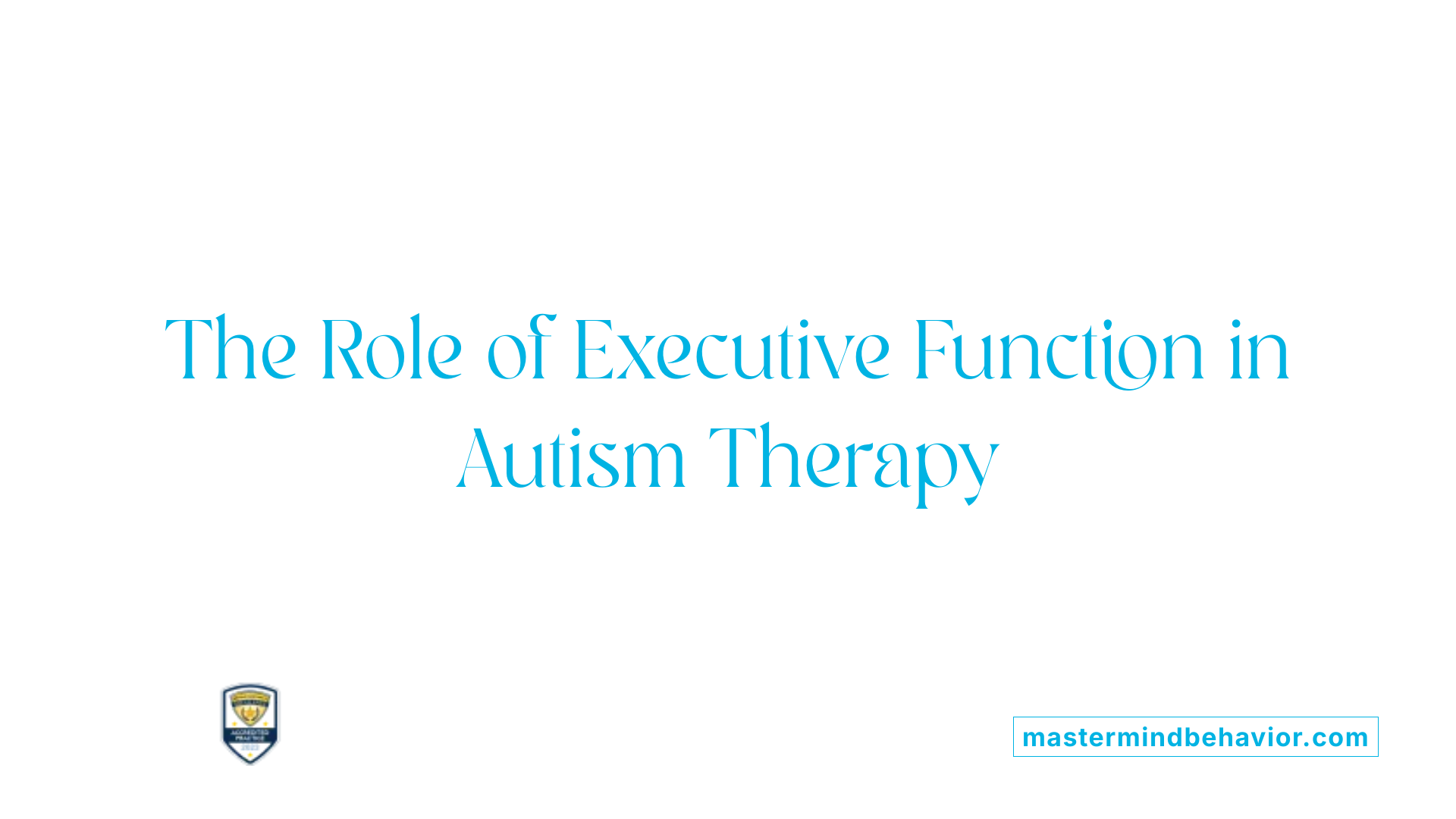
What is executive function and why is it important in autism therapy?
Executive function is a collection of mental skills that help us plan, organize, solve problems, pay attention, and regulate our emotions. These skills are essential for managing day-to-day activities, reaching goals, and living independently.
In people with autism spectrum disorder (ASD), difficulties with executive functioning are common. For example, they might struggle with starting tasks, shifting from one activity to another, or completing routines. These challenges can make everyday tasks like managing time, participating in social activities, or handling transitions more difficult.
Supporting these executive function skills through targeted strategies and interventions can significantly improve abilities in social, academic, and daily settings. For instance, using visual aids, checklists, or technology tools like reminder apps can help individuals stay organized and focused.
Overall, understanding and addressing executive function challenges in autism is crucial. It helps enhance independence, reduces frustration, and improves quality of life, making executive functioning a central focus in autism therapy.
Challenges Faced by Individuals with Autism Related to Executive Functioning
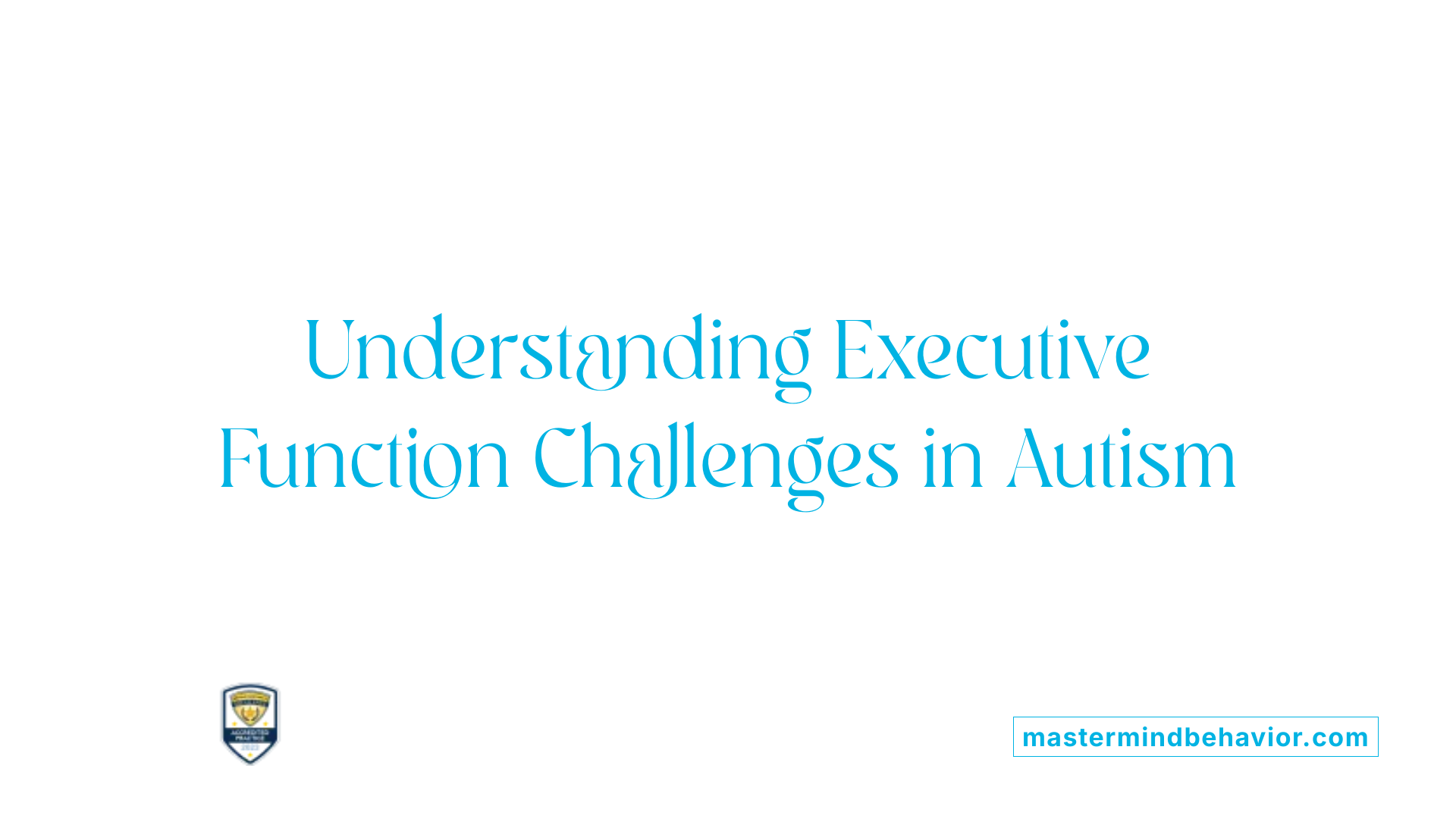
What challenges do individuals with autism face related to executive functioning?
Many individuals with autism experience notable difficulties with executive functioning skills, which are crucial for everyday life. These challenges include problems with planning, organizing tasks, and regulating emotions effectively. For example, they may find it hard to plan ahead for upcoming events or manage their time efficiently.
Common deficits involve working memory, which impacts their ability to hold and manipulate information temporarily. This can make following multi-step instructions or completing complex activities more difficult. Response inhibition, or the ability to control impulses, can also be compromised, leading to impulsive behaviors or difficulty stopping inappropriate responses.
These executive function issues often manifest in practical ways, such as struggling with daily routines, communication, and social interactions. They might find transitions between activities frustrating or overwhelming. In educational settings, this can result in challenges with completing assignments, maintaining focus, and adapting to changes.
Support strategies such as visual schedules, checklists, and using technological tools like apps help children and adults with autism develop better organization and task management skills. Structured routines and targeted interventions by professionals can significantly improve their ability to manage daily responsibilities.
Ultimately, addressing executive functioning challenges is vital to enhancing independence, reducing frustration, and improving overall quality of life for autistic individuals.
The Impact of Executive Functioning on Development and Daily Life in Autism
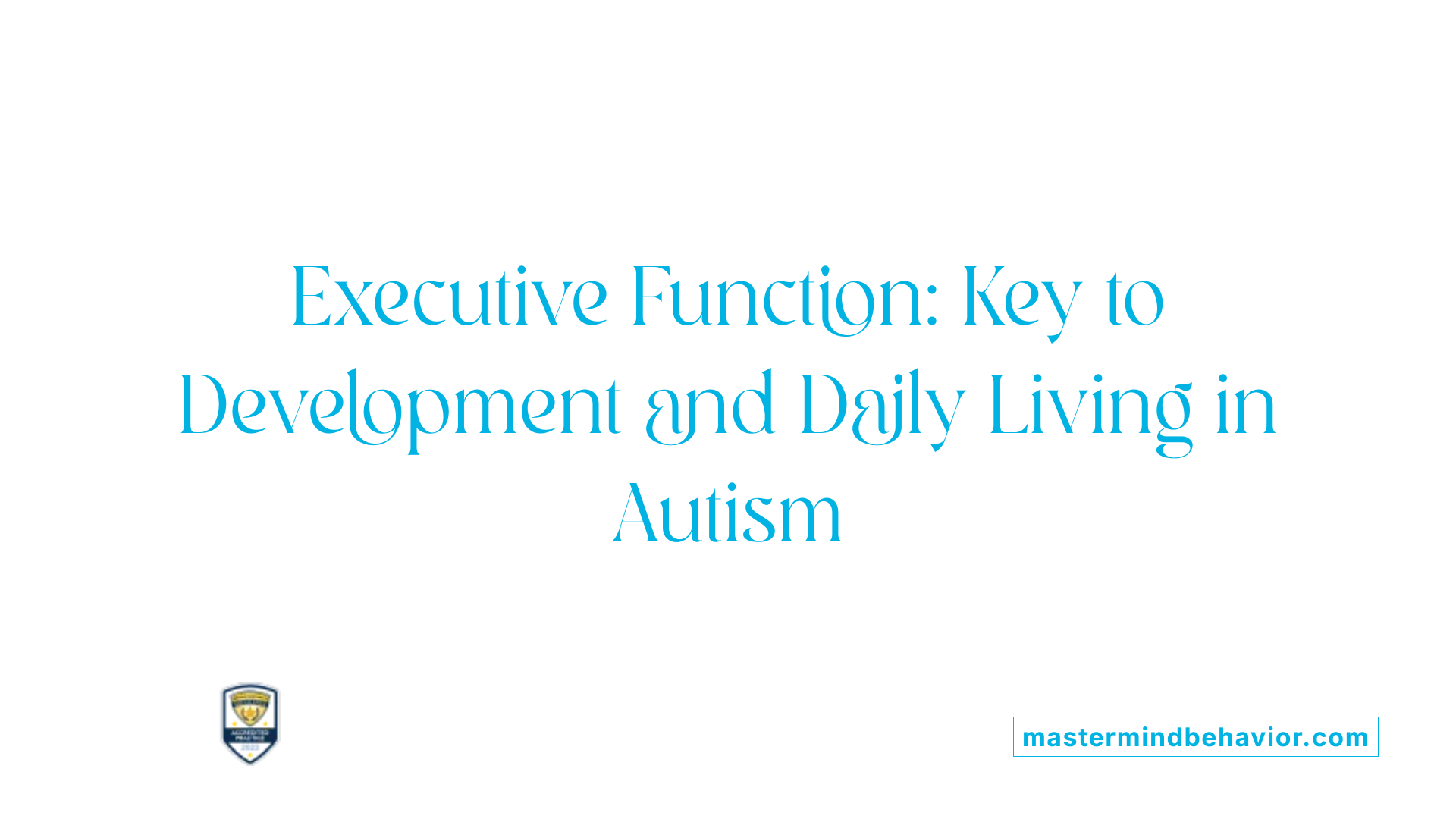
How does executive functioning impact development and daily functioning in individuals with autism?
Executive functioning is vital for a person’s growth and everyday life, especially in those with autism. It involves skills like planning, organizing, paying attention, flexible thinking, and emotional regulation. When these skills are strong, individuals can better manage routines, adapt to changes, and build social relationships.
In autism, many people face challenges with executive functions. These difficulties can lead to struggles with managing time, completing tasks, and adjusting to new situations. For children, this may mean trouble with schoolwork, following schedules, or handling transitions smoothly. For adults, it can impact independence, employment, and managing daily responsibilities.
Research shows that developing good EF skills early on is linked to happier social interactions, better understanding of others, and more independence later in life. Conversely, deficits in these areas are associated with increased anxiety, depression, and a lower quality of life.
Support strategies such as visual schedules, checklists, and organizational apps can help improve EF skills, making daily activities easier and reducing behavioral issues. However, ongoing assistance is often needed throughout life to help manage these challenges.
Overall, strengthening executive functions can significantly enhance social, academic, and everyday success for autistic individuals, highlighting the importance of early and continued support.
Strategies and Interventions to Support Executive Functioning in Autism
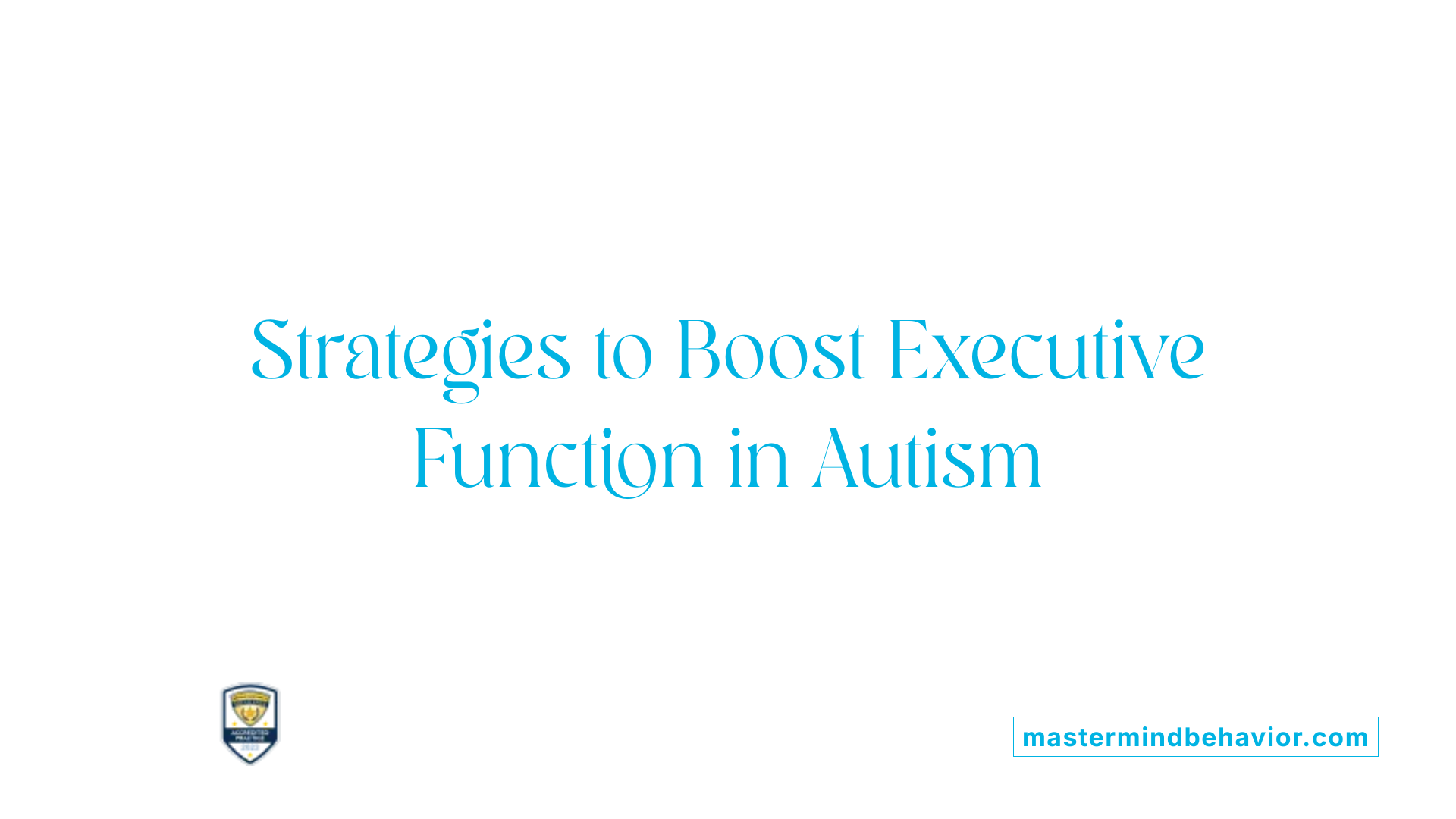 Supporting executive functioning in autism requires a combination of practical, evidence-based approaches that foster independence and build essential skills. Visual supports and checklists are among the most effective tools. These include pictorial calendars, visual activity schedules, and first-then boards, which help individuals organize their day, plan steps toward a goal, and understand expectations clearly.
Supporting executive functioning in autism requires a combination of practical, evidence-based approaches that foster independence and build essential skills. Visual supports and checklists are among the most effective tools. These include pictorial calendars, visual activity schedules, and first-then boards, which help individuals organize their day, plan steps toward a goal, and understand expectations clearly.
Technology also plays a crucial role. Apps designed for time management, task organization, and reminder systems can significantly enhance daily functioning. These digital tools assist in improving working memory, task initiation, and time management skills.
Creating structured routines and modifying the environment can make a big difference. Posting classroom schedules, reducing distractions with strategic seating arrangements, and breaking tasks into smaller, manageable steps make activities more accessible. These modifications help individuals with autism better regulate their behavior and adapt to changes.
Supporting independence and skill development is the ultimate goal. Strategies such as active engagement through "do with, not for" approaches, use of social narratives, and video modeling promote understanding and practice of important skills. Incorporating activities that strengthen core executive functions like flexibility, emotional regulation, and problem-solving—such as physical exercise and virtual training—has shown promising results.
Overall, combining visual supports, technological tools, environmental modifications, and targeted activities enables individuals with autism to develop stronger cognitive flexibility, emotional control, and task management, leading to improved daily living and social engagement.
The Connection Between Executive Function and Intervention Outcomes in Autism

How do executive function deficits influence therapy success?
In autism, challenges with executive functions (EF)—such as planning, flexibility, and working memory—can significantly affect how well a person benefits from therapy. These cognitive skills are crucial for managing routines, understanding instructions, and adapting to changes. When EF skills are weak, individuals may struggle with following therapy routines, applying learned strategies, or maintaining progress.
Research indicates that improving executive functions can directly enhance the effectiveness of various interventions. For example, strengthening skills like cognitive flexibility and impulse control can help individuals better navigate social situations and daily routines, leading to more meaningful improvements.
What impact do targeted EF interventions have?
Interventions specifically aimed at boosting executive functions, such as cognitive training exercises, visual supports, or physical activities like yoga and sports, show promising results. These strategies often include tools like checklists, timetables, and visual aids, which help individuals organize tasks and manage their time effectively.
Studies using ecological assessment methods, like questionnaires and real-world tasks, demonstrate that children and adults with autism who receive EF-focused support tend to develop better problem-solving abilities and greater independence. Enhancing executive skills can reduce frustration, improve emotional regulation, and foster more adaptive behaviors.
How are social and adaptive skills connected to EF support?
Executive functions play a vital role in social interactions and daily living skills. Difficulties in planning, flexibility, and inhibition can lead to social misunderstandings or trouble adapting to new settings. By improving EF, individuals often become more capable of initiating conversations, adjusting to social norms, and handling unexpected changes.
Furthermore, gains in EF are linked to better adaptive functioning—such as self-care, communication, and community engagement. Supporting EF development not only aids in therapy success but also promotes greater independence and social integration over time.
| Aspect | Effect of EF Deficits | Intervention Approach | Expected Outcomes |
|---|---|---|---|
| Flexibility | Difficulties with routines and transitions | Visual supports, cognitive flexibility exercises | Better adaptation to change |
| Inhibition | Impulsivity and inappropriate responses | Behavioral strategies, self-monitoring tools | Improved emotional regulation |
| Working Memory | Trouble following multi-step instructions | Checklists, visual aides | Increased task completion |
| Planning | Difficulty organizing daily activities | Timetables, planning apps | Enhanced independence |
Supporting executive functions through tailored strategies and interventions can significantly improve therapy success and overall quality of life for autistic individuals.
Insights from Neuropsychological Models on Executive Functioning in Autism
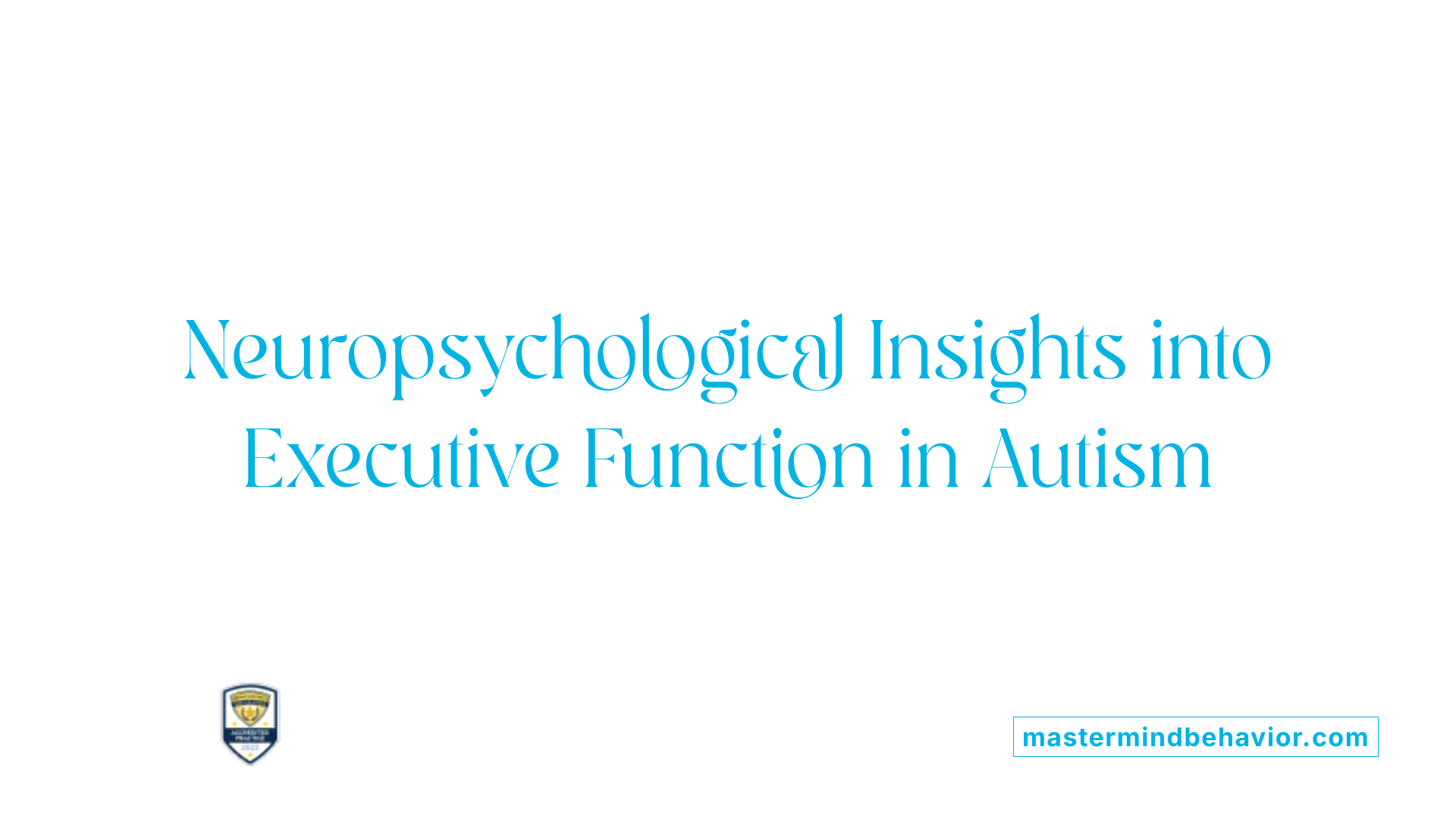
What insights do current neuropsychological models provide about executive functioning in autism?
Neuropsychological models give us a detailed understanding of how executive functioning (EF) operates differently in individuals with autism. These models reveal that people on the autism spectrum often experience distinct challenges across several EF domains, including set shifting (flexibility), response inhibition (impulse control), working memory, and planning.
One important aspect of these models is the recognition of the diverse range of EF abilities within autism, emphasizing that not all individuals have the same strengths or difficulties. This heterogeneity means that some may struggle more with flexibility, while others might have issues with memory or planning.
Theoretical frameworks such as the unity and diversity model suggest that while EF skills are interconnected, they also develop separately. This helps explain why some individuals may have specific EF impairments while others face broader challenges.
Underlying these behavioral observations are neurobiological insights. Brain regions like the prefrontal cortex play a central role in managing EF skills. Disruptions in neural networks, especially those involved in connectivity between the prefrontal cortex and other parts of the brain, are common in autism.
The excitation/inhibition (E/I) hypothesis is particularly influential. It proposes that imbalances in neurochemicals like GABA (inhibitory) and glutamate (excitatory) contribute to EF deficits. These neurochemical imbalances may lead to difficulties in regulating neural activity necessary for flexible thinking and impulse control.
Empirical research supports these ideas, showing that EF impairments often correspond with disruptions in key brain networks such as the default mode network (DMN), salience network, and executive control network. These networks are essential for attention, problem-solving, and adapting to new situations.
Furthermore, model frameworks such as the Research Domain Criteria (RDoC) promote a dimensional approach to understanding EF in autism. This means viewing EF deficits along a spectrum, recognizing that they vary widely among individuals and across development.
In summary, current neuropsychological models highlight that EF in autism is complex, influenced by neurobiological factors and developmental trajectories. These insights help tailor interventions and deepen our understanding of the neural basis of autism.
Moving Forward with Informed Support
A thorough understanding of executive functioning and its intersection with autism is essential for designing effective, personalized interventions. Recognizing the specific EF challenges faced by individuals with autism allows clinicians, educators, and families to tailor strategies that foster independence, reduce frustration, and improve social and functional outcomes. Ongoing research into neuropsychological models and ecologically valid assessments continue to enrich our knowledge, guiding more precise and effective supports. Emphasizing early intervention and lifelong support in executive skills is crucial so that autistic individuals can maximize their potential and enjoy a higher quality of life.
References
- Executive Functioning
- Autism and executive functioning skills
- Executive function: what is it, and how do we support ...
- Executive Function and Autism
- Understanding executive control in autism spectrum ...
- Understanding Executive Function – Pathfinders for Autism
- Understanding executive function challenges in autism ...










